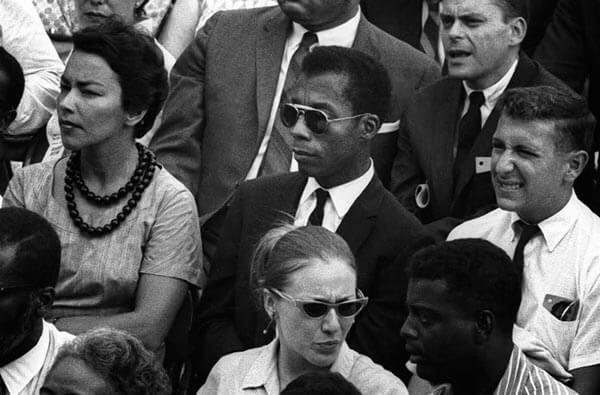Oscar nominated documentary “I Am Not Your Negro,” a film about iconic American writer James Baldwin, author of at least 20 books — novels, plays, essays and poetry, opened to packed movie theaters in February and is still drawing crowds.
On its way to be one of the year’s highest grossing non-fiction films, it is one of three black-themed Academy Award documentary nominees —7 ½ hour, Netflix released OJ: Made in American won in that category — “I am Not Your Negro” continues to screen at three New York City theatres Film Forum (downtown), Lincoln Center (mid-Manhattan), and Magic Johnson (Harlem). During the Presidents Day weekend it was playing in 333 theatres nationwide. It’s an amazing success for a documentary.
Growing up, Baldwin was one of the few contemporary writers Haiti-born Raoul Peck could relate to; his writings resonated.
Decades later, Peck had unlimited access to the Baldwin archives from the author’s family enabling him to create a film that introduces Baldwin to new generations.
Baldwin began with 30 pages for a book in 1979 called “Remember This House.” Never completed, this unfinished book that links the lives of civil rights activists Martin Luther King, Medgar Evers, and Malcolm X, all three assassinated, was the jumping off point for Peck’s film.
Entirely in the words of James Baldwin, Samuel Jackson narrates taken from observations, writings and private correspondence. Archival news and other media, Baldwin TV interviews as well as Hollywood clips, historical advertisements and training films offer the visuals that explore the subjects of race and race relations.
In envisioning the completed book that Baldwin never finished, Raoul Peck brings a radical, up-to-the-minute examination of race in America, a journey into black history that connects the past of the Civil Rights movement to the present of #BlackLivesMatter.
Baldwin grew up in Harlem, spent time in Greenwich Village, became an ex-pat in France and died in 1987 in the south of France where he had been living for almost 40 years. “Go Tell It On The Mountain” and “Notes of A Native Son” are among the most well-known among over 37 books that Baldwin has authored.
Of the Civil Rights martyrs (Medgar Evers died on June 12, 1963, Malcolm X died on Feb. 21, 1965 and Martin Luther King Jr. died on April 4, 1968) that are highlighted, Peck says, “These three fought on quite different battlefields. But in the end, all three were deemed dangerous. They were unveiling the haze of racial confusion. James Baldwin also saw through the system. And he loved these men. These assassinations broke him down.” It was their links and similarities that Baldwin was going to write about.
Peck reveals, “He helped me in connecting the story of a liberated slave in its own nation, Haiti, and the story of modern United States of America and its own painful and bloody legacy of slavery. I could connect the dots.”
Raoul Peck has directed 17 other films, (known for “Sometimes in April” and “Lumumba”) and is in post-production of “Le jeune Karl Marx” (The Young Karl Marx.) For a year and half (in 1986-87) Peck was Haiti’s Minister of Culture. Currently, he is president of La Femis, the French state film school.
























